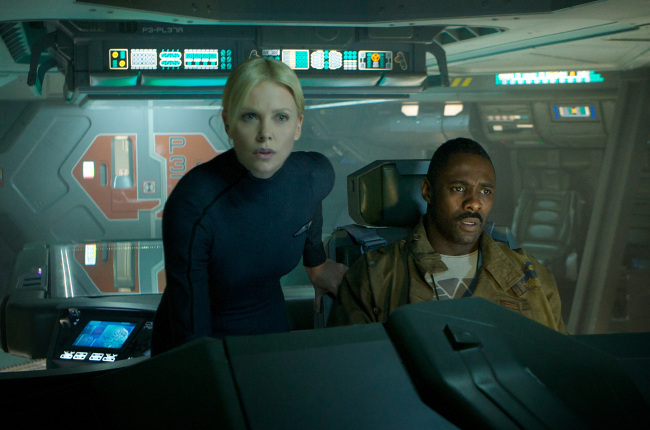It may not be ‘Alien,’ but ‘Prometheus’ is never boring
By Claire LeePublished : June 8, 2012 - 18:39
The most electrifying sequence in “Prometheus” ― Ridley Scott’s ambitious and entertaining, if sometimes muddled new science-fiction thriller ― occurs midway through, when Dr. Elizabeth Shaw (Noomi Rapace) discovers something creepy and crawly pulsating from within her womb. A scientist aboard a spaceship near the end of the 21st century ― and until recently under the impression she couldn’t conceive ― Elizabeth races to extract this foreign object, which is growing much more quickly than any normal fetus. She finds a high-tech machine aboard the ship, cylindrical and glowing like a tanning bed, programmed to perform unmanned surgery ― but, ouch, this one is gonna hurt.
What makes all of this so clever is that it deftly tips its hat to the “Alien” franchise, the primary subtext of which was the prenatal anxieties of mothers, whether biological, surrogate or alien. This new movie takes place approximately 40 years before the original “Alien,” and features entirely new characters; it’s not a prequel, its creators have repeatedly insisted. But screenwriters Jon Spaihts and Damon Lindelof draw a direct line from Elizabeth Shaw to Ellen Ripley, the iconic character played by Sigourney Weaver in the “Alien” movies ― and they cleverly suggest that, well into the future, women will still be fighting an eternal battle for control over their reproductive rights.
What makes all of this so clever is that it deftly tips its hat to the “Alien” franchise, the primary subtext of which was the prenatal anxieties of mothers, whether biological, surrogate or alien. This new movie takes place approximately 40 years before the original “Alien,” and features entirely new characters; it’s not a prequel, its creators have repeatedly insisted. But screenwriters Jon Spaihts and Damon Lindelof draw a direct line from Elizabeth Shaw to Ellen Ripley, the iconic character played by Sigourney Weaver in the “Alien” movies ― and they cleverly suggest that, well into the future, women will still be fighting an eternal battle for control over their reproductive rights.

Nothing else that happens in “Prometheus” comes close to matching the sheer visceral power of this sequence. But more often than not, the film reminds us of Scott’s ability to orchestrate tense, unnerving set pieces; his knack for creating sleek and convincing future-worlds (also famously on display in “Blade Runner”); and his deep empathy for the plight of women trying to assert their independence in a man’s world. (Remember, after he introduced the world to Ellen Ripley, he also gave us “Thelma and Louise” and “G.I. Jane.”) After a string of well-made, but fundamentally heartless efforts ― “Robin Hood,” “Body of Lies,” “American Gangster” and “A Good Year,” among others ― it ranks as the director’s strongest work since 2001’s “Black Hawk Down.” (Full disclosure: One of the film’s executive producers, Michael Ellenberg, is a good friend.)
Dr. Shaw has stowed away with her boyfriend and fellow geologist (Logan Marshall-Greene, from the TV series “Dark Blue”) on a spaceship mission, funded by the mysterious Weyland Corp. The geologists believe they’ve identified the planet where human life originated ― and that our creators might still be living and thriving there. Woken from a two-year slumber by Weyland’s onboard representative, Meredith Vickers (an underused Charlize Theron) and her eerie android butler David (Michael Fassbender), they arrive on the planet in question, where all signs of life would appear to be eradicated.
Held up to the gold standard of the Scott-directed “Alien” or its equally masterful, James Cameron-directed sequel “Aliens,” “Prometheus” admittedly (and perhaps inevitably) comes up short: None of the supporting characters, including the ship’s captain (Idris Elba, from “The Wire”), are as vividly realized as the crew members of the original Nostromo. (Fassbender’s deviously fey android comes closest, without quite erasing our memories of Ian Holm’s hauntingly doomed android Ash.)
Rapace, such a pitiless firebrand in the Swedish-language version of “The Girl with the Dragon Tattoo,” here seems meek and strangely dowdy (her helmet-head-with-bangs hairdo brings to mind Frances McDormand in “Fargo”). All of the screenplay’s New Age-y chatter about God and Darwinism and the origin of life too often comes at the cost of more primal pleasures ― chiefly, watching aliens and humans fight to a bloody death. Didn’t Hollywood learn anything from those ill-fated “Matrix” sequels?
Yet I was never bored by “Prometheus,” which is more than I can say for any of this summer’s other lumbering blockbusters. Photographed by Dariusz Wolski, the story shifts gorgeously from the gleaming steel-and-white interiors of the spaceship, to the golden-hued and sandy surfaces of the alien planet, to the barely-lit caves where snail-like creatures slither through muddy waters.
In a handful of scenes, including that afore-mentioned Caesarean section, Scott taps into the fundamental horror at the core of the “Alien” mythology: the idea of foreign bodies invading our own, sliding into one orifice and then coming out of a newly created one. He creates a knot of dread in your stomach that you desperately hope doesn’t develop into a more serious condition.
By Christopher Kelly
(McClatchy Newspapers)
(MCT Information Services)







![[KH Explains] Hyundai's full hybrid edge to pay off amid slow transition to pure EVs](http://res.heraldm.com/phpwas/restmb_idxmake.php?idx=644&simg=/content/image/2024/04/18/20240418050645_0.jpg&u=20240419100350)






![[From the Scene] Monks, Buddhists hail return of remains of Buddhas](http://res.heraldm.com/phpwas/restmb_idxmake.php?idx=652&simg=/content/image/2024/04/19/20240419050617_0.jpg&u=20240419175937)

![[KH Explains] Hyundai's full hybrid edge to pay off amid slow transition to pure EVs](http://res.heraldm.com/phpwas/restmb_idxmake.php?idx=652&simg=/content/image/2024/04/18/20240418050645_0.jpg&u=20240419100350)

![[Today’s K-pop] Illit drops debut single remix](http://res.heraldm.com/phpwas/restmb_idxmake.php?idx=642&simg=/content/image/2024/04/19/20240419050612_0.jpg&u=)